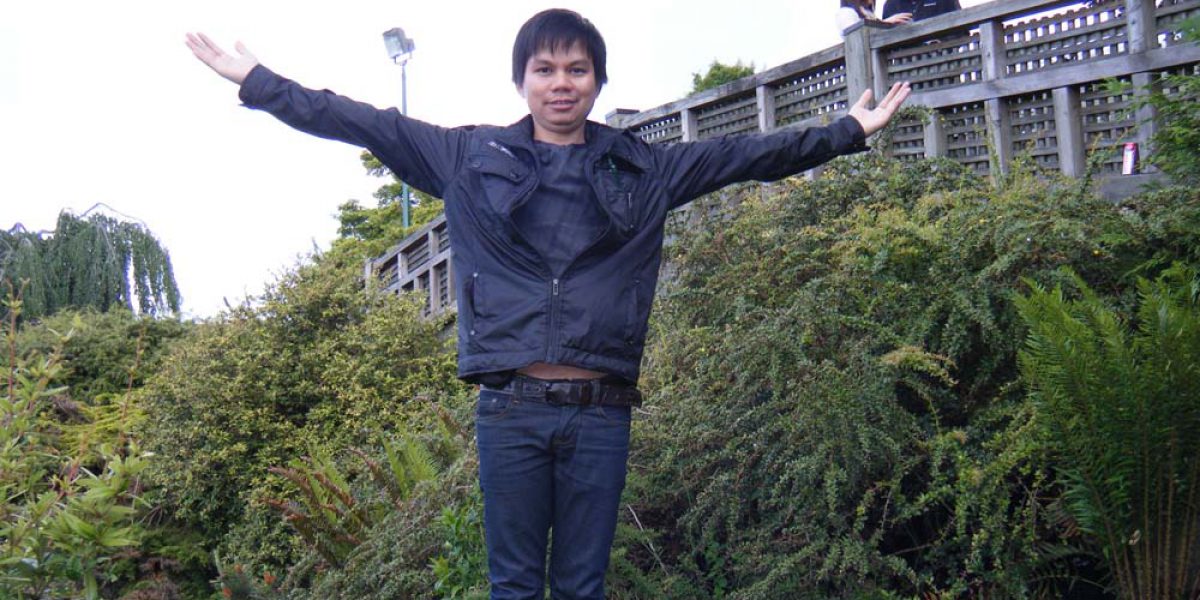Canada: starting fresh after fleeing Cambodia
03 September 2012|Pen Puthsaphea (Phea)

Vancouver, 3 September 2012 — More than 165,000 refugees reside in Canada, according to the latest UNHCR statistics, and yet many of their stories are left untold.
Pen Puthsaphea (Phea), 29, is a former Cambodian journalist who escaped to Thailand in 2010. In March 2012, Phea was arrested by Thai authorities and threatened with deportation. After being recognized as a refugee, he was immediately processed for resettlement.
He now lives in Vancouver, Canada. Last month, Phea wrote to tell us his story.
Fleeing political oppression in Cambodia
I am the youngest child of six, raised mostly by my older sisters. I was born in a small village in Kampot province in southwestern Cambodia.
I witnessed so much corruption in my country, and wanted to see it change from poor to rich, and towards greater respect for human rights. Authorities harass and intimidate civil society groups with impunity, and land grabbing and forced evictions by officials remain pervasive problems.
After graduating from high school in 2002, I went to Phnom Penh to work as a journalist with the Sam Rainsy Party — the opposition political party founded in 1998 whose leader remains exiled.
While working with the Sam Rainsy Party, I wrote and published two high school textbooks about democracy, which also noted government corruption. Afterwards, I began to fear for my life, as freedom of speech is prohibited and political critics are frequently persecuted and imprisoned.
More than 2,000 people are arbitrarily detained without a trial in Cambodia, and torture is commonly used to extract confessions, reported Human Rights Watch in 2011.
Scraping out a living in Bangkok
In August 2010, after hiding for weeks, I finally escaped to Thailand. I immediately applied for refugee status with the UN Refugee Agency.
I had hoped for instant protection, but the harsh reality is that asylum seekers have no protection from arrest and deportation in Thailand. The police could arrest me at any moment, and without the proper visa, I could be indefinitely detained in one of Thailand’s notorious detention centres. I was constantly scared because I did not even possess a passport.
Without any family, friends, or relatives, I was on my own. I scraped out a living to put food in my stomach. Every morning I rose at 4 in the morning to bag vegetables at the market. In the evenings I worked picking chili heads. In one day I could earn at most 190 THB, or 6 USD.
When Thailand was hit by floods in July 2011, I bought a boat to taxi people through the water, for 20 Baht, roughly 64 cents US per trip. The boat had no engine, so I used the strength of my arms to pull or push the boat everywhere that customers needed to go.
It was the only way to survive. Meanwhile I volunteered at Jesuit Refugee Service Thailand and Asylum Access Thailand as an interpreter for Khmer and English, receiving a small stipend for travel and phone use.
Finding NGO assistance
In June 2011 I began interning at FORUM-ASIA, a regional human rights organisation, and updated their website.
Life began to improve. I received 350 Thai THB per day, roughly 11 USD. Office work was very different from my former job where I toiled outdoors under the hot sun and rain.
Still, it had been more than ten months since I applied for refugee status, and the UNHCR results had still not arrived. They delayed my interview seven times without any explanation. I felt hopeless and discouraged.
Then, on 11 March 2012, I was arrested with my friend, who was also a refugee. The Thai police picked us up at 5 in the afternoon while we were walking along the sidewalk. We were arrested for not having the valid visa and passport.
We spent the night at the police station sleeping on the dirty floor of a mosquito-infested cell. The next morning, we were escorted to the Immigration Detention Centre (IDC) in Bangkok.
Many humanitarian NGOs visited me at the IDC. JRS lawyers, members of FORUM-ASIA, and the National Human Rights Commission of Thailand came to discuss my case with me.
In the IDC in Bangkok, I was at risk of deportation from Thailand back to Cambodia, where I would surely have been arrested. The NGOs helped me to complete the paperwork for resettlement.
On 29 March 2012, I boarded an airplane bound for Vancouver, Canada.
Living in Canada
At the moment I live with a Cambodian family in Surrey, British Columbia. I pay for my own room and board with the wages I earn as a labourer at a glass manufacturing company in Langley, eastern Vancouver.
Vancouver is a beautiful city, and I love it here. I can now start a new life with freedom. But I have to try hard to study and find a job because my skills as a journalist are not recognised here.
One day I hope that I can return to my home country safely. Then I will resume my job as a writer.


